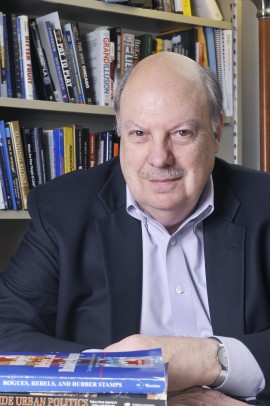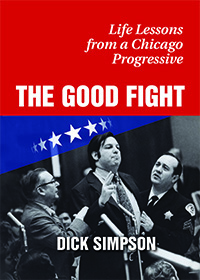Professor’s memoir reflects on political, personal life
Dick Simpson has established himself as one of Chicago’s top political commentators for delivering candid views on Chicago and state politics.
In his recently published memoir, The Good Fight: Life Lessons from a Chicago Progressive, the longtime UIC political science professor turns the table with an introspective look at his aldermanic career, social activism and personal life spanning five decades.
“I hadn’t thought I would ever write a memoir and it became possible only after I discovered a basic format of short vignettes of 1,500 words or less,” he said. “Once I began to recount the stories and what those aspects of my life meant to me, it was suddenly relatively easy to write, but it took endless revisions and changes to make the book flow like I wanted.”
In 1967, Simpson accepted a teaching position at UIC, settled on Chicago’s North Side, and promptly immersed himself in various political campaigns. Four years later, he ran for and won the 44th Ward aldermanic seat, which he held for two terms until stepping away in 1979.
As alderman, Simpson created a Ward Assembly so residents could make their case on key issues to influence his vote in City Council. He was known for advancing progressive legislation and led the independent aldermen who opposed Mayor Richard J. Daley’s political machine in city government.
Symbolizing Simpson’s clashes with the political establishment, the book cover features a photo of police physically restraining him in the City Council chamber. The incident occurred after Daley ordered him silenced for criticizing city insurance business being directed to Daley’s sons.
“Behind the scenes, I got along well with the aldermen, but Daley and I had only two brief private conversations, like when I congratulated him on winning his re-election in 1975,” Simpson recalled. “Our clashes were all out in the open and public and about the future of the city we both loved.”
During the 1980s, Simpson continued teaching at UIC, led a Chicago-based civil rights and human rights organization, graduated from theological seminary, and became a minister at Wellington Avenue United Church of Christ.
He ran unsuccessful campaigns in 1992 and 1994 against the powerful Congressman Dan Rostenkowski, who later was convicted on federal corruption charges.
Simpson openly writes about the difficulties he faced to balance work, family and exterior demands versus the need for interior growth.
“My obvious failures at times, like losing my congressional election, were eclipsed by the greater personal losses to divorce and my wife’s death from cancer,” he said. “But I have grown and continue to grow personally from both my private and public life.”
His often-cited research, which includes several reports and a book about political corruption in Chicago and Illinois, has resulted in several government reforms. Simpson’s other publications include co-authored books on Chicago politics, government and economy in the 21st century, and a book for educators on teaching political engagement at the colleges and high school levels.
The latter issue, civic engagement among young voters, is an area of focus for Simpson at UIC, where he has played a key role in campus efforts to boost student voting rates that rose from 42 percent in 2012 to 55 percent in 2016.
Expect voting to remain high in 2018, he said.
“It has taken a long time, but I think 2018 will see a reemergence of the 1960s — my generation — because students see once again what is at stake with immigration, the tax bill that effects them directly, the effect of state government cutbacks, and the potential of wars they may have to fight abroad,” he said.
Simpson said UIC has helped shape his life and he wants readers to learn from both his success and mistakes.
“I hope readers take away lessons that make their public and their private personal life better,” he said. “But most of all, that they are engaged to continue the good fight.”
The Good Fight, published by Golden Valley Press, is available online and at the UIC Bookstore.


